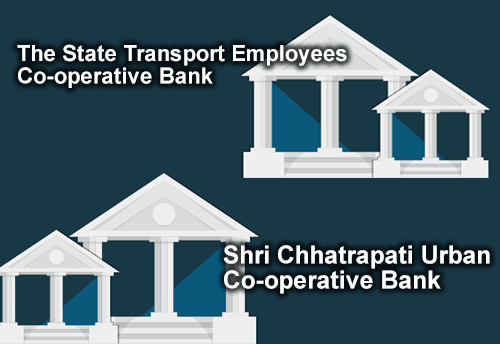RBI cancels licences of The State Transport Employees Co-operative Bank and Shri Chhatrapati Urban Co-operative Bank
Updated: Feb 09, 2017 06:45:53am

RBI cancels licences of The State Transport Employees Co-operative Bank and Shri Chhatrapati Urban Co-operative Bank
Mumbai, Feb 9 (KNN) Reserve Bank of India (RBI) has cancelled the banking licence of The State Transport Employees Co-operative Bank Ltd., Ahmedabad (Gujarat) after which the bank has been barred from transacting the business of “Banking”.
“It is hereby notified for information of the public that the Reserve Bank of India has cancelled the licence of The State Transport Employees Co-operative Bank Ltd., Ahmedabad (Gujarat) vide order dated January 13, 2017,” RBI said in a statement.
Accordingly, the bank has ceased to be a “Co-operative bank” as defined in Section 5 (cci) of the Banking Regulation Act, 1949 read with Section 56 of the Act and all the provisions of the said Act applicable to the said co-operative bank shall cease to apply to it.
The bank has been prohibited from carrying on banking business in India under Section 22 of the Banking Regulation Act, 1949 (As Applicable to Co-operative Societies) read with Section 56 of the Banking Regulation Act, 1949 (As Applicable to Co-operative Societies).
“As such, the bank is precluded from transacting the business of “Banking” as defined in Section 5(b) of the Banking Regulation Act, 1949 (As Applicable to Co-operative Societies) including acceptance / repayment of deposits,” RBI said.
RBI has also cancelled the licence of Shri Chhatrapati Urban Co-operative Bank Ltd., Pimple Nilakh, Pune, Maharashtra.
The order was made effective from the close of business on February 07, 2017.The Registrar of Co-operative Societies, Maharashtra, has also been requested to issue an order for winding up of the bank and appoint a liquidator.
RBI said, the licence of the bank has been cancelled as the bank did not comply with the provisions under Sections 11(1) and 18 of the Banking Regulation (B R) Act, 1949 (AACS).
“Its operations were being carried out in a manner detrimental to the interest of the present and future depositors and that of the public and in violation of Section 22(3)(a), 22(3)(b), 22(3)(c), 22(3)(d), 22(3)(e) and 24 of the Banking Regulation Act, 1949 (AACS),” RBI said.
The bank was not in a position to pay its present and future depositors in full as and when their claims accrue. The financial position of the bank leaves no scope for its revival.
Public interest would be affected adversely if the bank was allowed to carry on banking business; any further, said the apex bank.
The central bank further said that on liquidation, every depositor is entitled to repayment of his/her deposits up to a monetary ceiling of Rs 1,00,000/- (Rupees one lakh only) from the Deposit Insurance and Credit Guarantee Corporation (DICGC) as per usual terms and conditions. (KNN Bureau)












